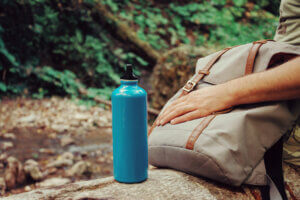As summer temps begin to tick up, it’s important to understand the signs and symptoms of heat exhaustion. It’s also important to know how to prevent it, and what to do if you or someone with you suffers from heat-related illness.
Have you ever been having too much fun in the sun on a hot day and started to feel light-headed, weak, cranky or dizzy? You might have been suffering from heat exhaustion. When you experience an excessive loss of water or salt (typically through too much sweating), your body responds by going into heat exhaustion. The good news? You can take some easy steps to prevent heat exhaustion and heat stroke. While you gear up to get outside this summer, especially if you will adventure in the higher altitudes of the Roaring Fork Valley, make sure you understand the strategies for preventing heat exhaustion.

Understanding Heat Exhaustion
As mentioned, heat exhaustion occurs when your body loses too much water and salt too fast. People often use the terms heat stroke and heat exhaustion interchangeably, but it’s important to think of these two conditions as varying levels of heat-related illness, with one being more threatening than the other. Once your body loses its ability to cool itself through sweating, you have developed heat exhaustion. If left untreated, heat exhaustion can quickly advance to heat stroke, which can be life-threatening without medical intervention. Those suffering from heat stroke lose their ability to sweat altogether.
Common risk factors of heat exhaustion include:
- Age, with the very young and older adults being most vulnerable
- Over exertion in hot weather
- Lack of access to air conditioning or shade
- Sudden exposure to hot weather
- Health conditions such as heart or lung disease
- Certain medications (check with your doctor to learn of any potential side effects)
Want more information on staying healthy outdoors? Sign up to receive regular updates from Aspen Valley Hospital!
Recognizing the Signs of Heat Exhaustion
It’s important to understand the signs and symptoms of heat-related illness as you head into the summer months or to warmer climes. Symptoms of heat exhaustion can include:
- Fatigue
- Dizziness
- Heavy sweating
- Cool, moist skin
- Faintness
- Nausea
- Headache
- Weak, rapid pulse
- Low blood pressure when you stand
Be aware of both physical and mental changes, including changes in body temperature and appearance, and changes in mood and mental acuity in yourself or others.
Strategies for Preventing Heat Exhaustion

Drink lots of water! Staying hydrated is your biggest weapon in preventing heat-related illness. Pack more than you think you’ll need and drink plenty along the way, stopping frequently for water breaks as needed. Also, wear the appropriate clothing, including light-weight, wicking layers that protect your skin from sun exposure. Plan outdoor activities with the forecast and altitude in mind. If the weatherman is calling for record temps, it might be better to head to the lake than trying for the summit. Additionally, try to acclimate to heat as best as you can. Similarly to adjusting to higher altitudes, those who travel to muggy, hot climates from more temperate zones should factor in some time to get used to the warmer weather before exerting themselves too much.
Your smartphone can be an important tool in keeping heat exhaustion in check. Weather apps and forecasts often include the daily heat index, which can help dictate how safe physical activity is on that particular day. If you do plan to play outside in the heat, have a cooling strategy in mind, including the nearest shade or shelter and access to air conditioning. If you’re in the backcountry, be mindful of lakes, rivers and creeks that might offer a quick way to cool down and make sure your camping first aid kit is properly stocked.
Finally, avoid excessive sun exposure. It can be hard to do, especially in those early days of summer when you’re starved for some Vitamin D, but being mindful of how much time you spend in the sun can help prevent heat exhaustion and heat stroke. In this article, Amy Behrhorst, PA-C of Aspen Valley Hospital talks about the Colorado sun and why it’s so easy to get sunburned in the mountains.
Conclusion
Heat exhaustion can sneak up on us in the best of times, when the sun is shining, the days are long, and summer activities start stacking up. But it’s incredibly important to be aware of how much time you’re spending in the sun and how warm temperatures are expected to get. It’s easy to prevent or avoid heat-related illness by taking a few easy steps to prepare. These include avoiding over exposure, knowing your nearest cool area, wearing the proper clothing, and most importantly, drinking plenty of water.

